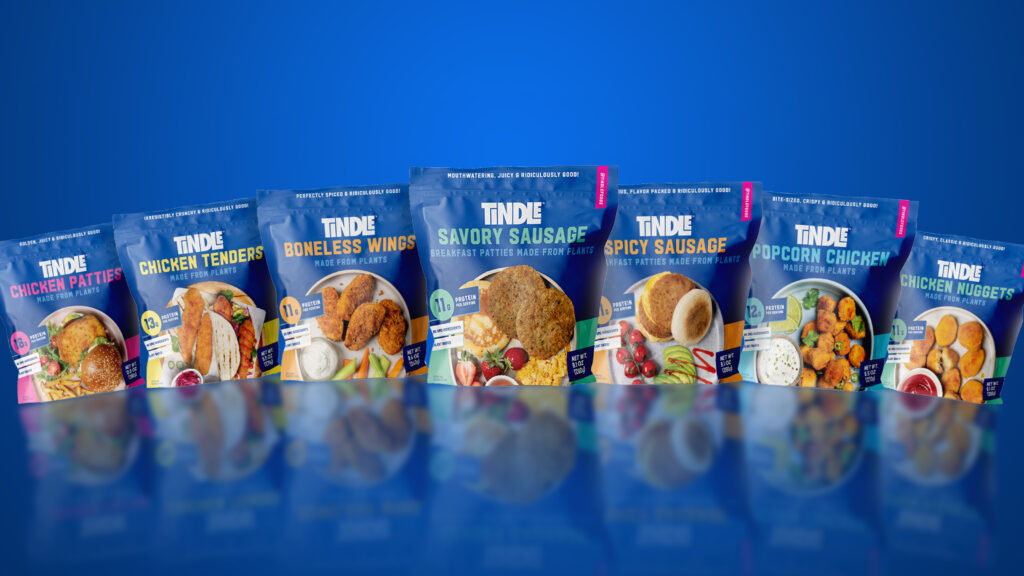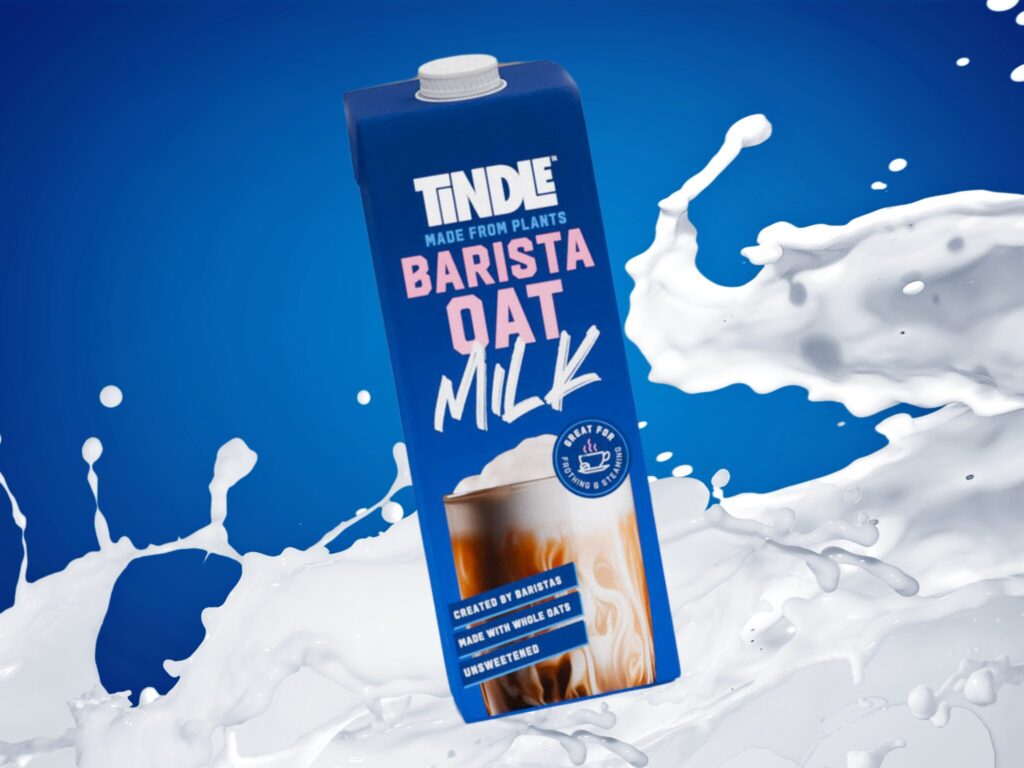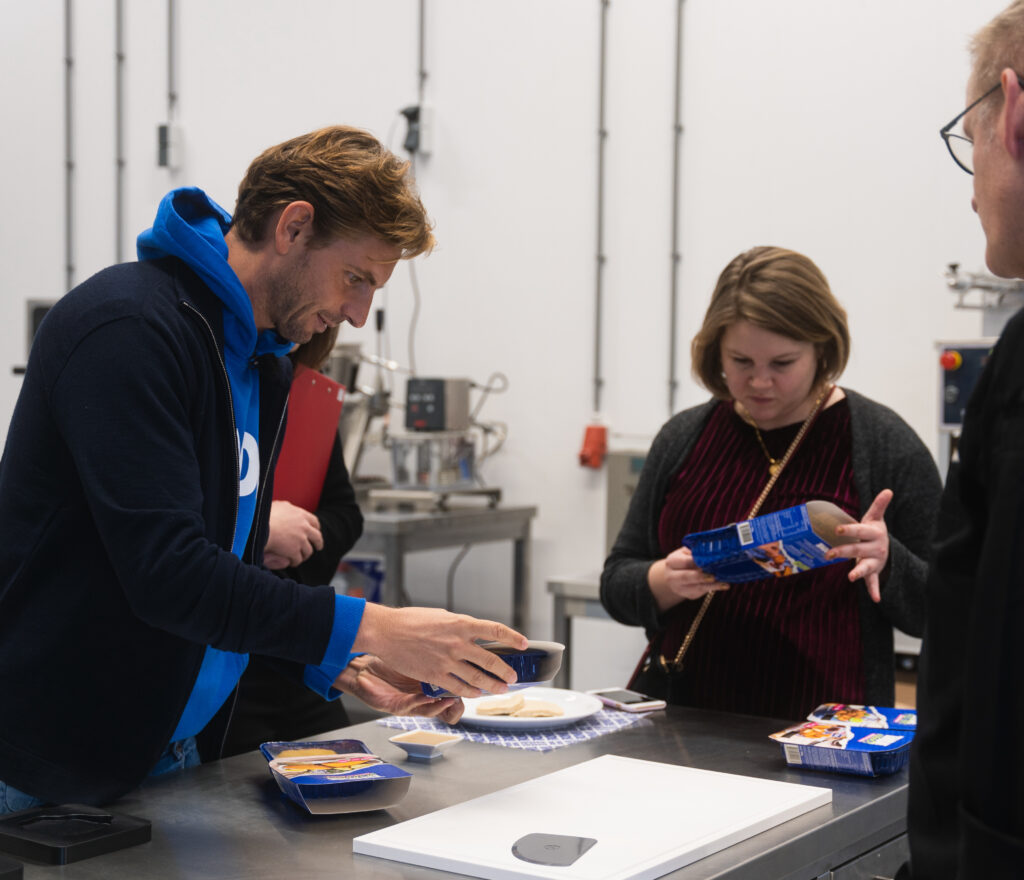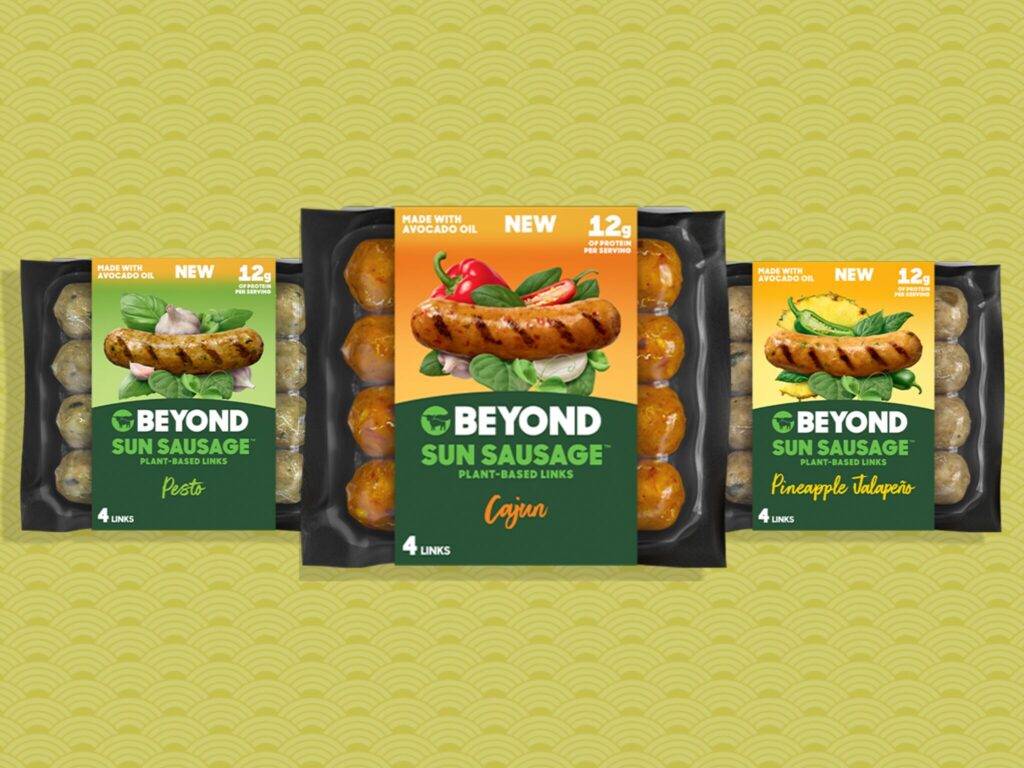TiNDLE Foods CEO Timo Recker: There Isn’t A Lack of Interest – the Demand Just Wasn’t As Strong As Predicted
14 Mins Read
Timo Recker, CEO of plant-based startup TiNDLE Foods, talks evolving consumer attitudes, sales and funding declines, the importance of taste, and his admiration for Beyond Meat.
It’s been nine months since Timo Recker took over the reins of TiNDLE Foods from his fellow co-founder Andre Menezes. The leadership change came at the end of a big year for the Singapore-headquartered startup, and that momentum hasn’t halted in 2024.
A year ago, the company rebranded itself from Next Gen Foods to align with its flagship plant-based meat brand TiNDLE, months after acquiring London-based alt-dairy startup Mwah! This was followed by the launch of a domestically produced breakfast sausage in the US, and the brand’s stateside retail debut months later.
All the while, TiNDLE Foods was making major strides in Europe, especially the UK and Germany, Recker’s home country. Under his leadership, the company has debuted in Switzerland, unveiled a crop of new stuffed chicken range – which were rolled out in August – introduced a new bratwurst line, and is diversifying its portfolio with a forthcoming barista oat milk.

It has also been forming partnerships with physical and e-commerce retailers in the US, recently launching its products into 160 Giant/Martin’s stores on the East Coast. And oh, it was at the Met Gala.
Recker, the former founder and CEO of LikeMeat (now part of the Livekindly Collective), is now back in Germany, overseeing TiNDLE Foods’ additional growth plans for Europe. This isn’t the first time he’s at the helm – having co-founded the startup with Menezes, he served as CEO from July 2020 to May 2021.
Now, as the plant-based sector suffers from faltering sales, lower investment, and misguided media coverage, Recker speaks to Green Queen in a wide-ranging interview. He explains how the role of a CEO has changed since he was last in it, what the industry is missing currently, why a host of startups have been forced to shut down, and what governments can do better.
This interview has been edited for clarity and concision.
Green Queen: You were previously CEO for a year. Why did you decide to return to this position?
Timo Recker: I held the role of CEO in 2020 through the first part of 2021, while we were still in the early stages of R&D and without a consumer product available yet. Andre Menezes took the helm as CEO at the start of 2021 to bring our first product, TiNDLE Chicken, to market, and he led the company through a period of rapid growth, establishing a name for the brand globally first in foodservice – by working with many recognised and trendsetting partners in the space.
At the start of this year, our focus was to grow the distribution of our products, especially in retail, where I have experience from my time leading LikeMeat. Foodservice will always be an important and influential channel for us, as that’s where many consumers have first tried TiNDLE products or will be introduced to new brands. But our goal was always to be available in both channels and make great-tasting plant-based products accessible to consumers wherever they shop.
We’re in grocery stores today across Germany, Switzerland, the UK, and the US – many of which are some of the biggest and most challenging retail markets in the world. This year, we’ve been focused on introducing TiNDLE Foods to new retailers, but also growing and diversifying the product range to fit wider consumer needs.

GQ: How has the role changed at TiNDLE Foods from then to now?
TR: We’re working within a very different context today – both operationally with the addition of wider grocery distribution and in terms of the global economic situation.
As we’re available in retail both in Europe and the US today, our go-to-market approach needs to consider the grocery customer, whereas before we were targeted on restaurants and operators. The path to purchase is different here and a lot of work [is required] to understand the consumer needs to drive category growth.
We’ve had to update or develop new workstreams internally to address those needs, while maintaining our commitment to using high-quality and simple ingredients – which we’ve been doing since the very start.
Plant-based sales have also declined, but at the same time, we’re seeing moves within the space that indicate it’s not necessarily going away. A number of mergers and consolidation efforts have occurred over the last few years, and major global retailers are adding plant-based products to their private labels. To me, these are positive signals – and while organic growth may be slower than anticipated, our industry is adapting and actually getting closer to understanding the needs of our shoppers.
This doesn’t impact our category alone, as we’re seeing ripple effects of market factors like inflation, high interest rates, and global conflict and unease hit many industries and businesses. Part of my role today is navigating this market and making sure TiNDLE remains nimble as we keep an eye on achieving our mission of reducing humanity’s reliance on animals as a food source.
GQ: Building on that, how has the industry changed since the last time you were CEO?
TR: There’s now a wider understanding and acceptance of plant-based foods. Especially in Europe, where LikeMeat started, it’s become increasingly popular and frankly, the norm, to eat plant-based foods on a regular basis. It’s no longer a sustainability ‘fad’ or occasional dining habit, but one that’s rooted in the lifestyle and culture now.
Germany is the biggest market for plant-based foods, with the UK following behind as second. In Germany, where we have widespread distribution of our retail products with the Edeka Group, sales of plant-based foods have grown year-on-year – up by 42% since 2020. There’s generally a wider acceptance and willingness to try plant-based foods, which wasn’t the case when I started LikeMeat in 2013.
That also means there are more players and diversity of offerings in the market today. TiNDLE is not the only company making plant-based foods, so we do have the challenge of educating consumers about our products and what makes them different. While we’ve always focused on R&D and product innovation, we are also doing so now with a lens on home cooks and the retail experience.

GQ: TiNDLE Foods recently made a move into plant-based milk, a year after acquiring Mwah – can you tell us more about the product’s development and applications? When and where are you launching the milk and the gelato?
TR: We previewed our barista oat milk earlier this year at the Natural Products Expo West show, where we were able to gather product feedback from a wide range of consumers and retailers. With that helpful feedback, we’ve been working on finalising the final formulation for different regions.
We are happy with the innovation and product quality so far and have developed what we believe is a differentiated product in the barista milk category. We will share more once we have a rollout date and launch details confirmed.
Our acquisition of Mwah! last year allowed us to incorporate their dairy technology platform and capabilities, which will serve as a basis for future dairy foods. The platform will allow us to create gelato in the future, but for now, we’re focused on the development of our barista milk product.
GQ: You’ve always talked about being a multi-category company. Is TiNDLE Foods working on other meats like beef, pork or seafood too?
TR: Our current focus is widening the reach of our current products, which includes the complete TiNDLE Chicken range (for both foodservice and retail) and TiNDLE Bratwursts (in Germany), and continued development of our dairy products.
With the market for plant-based milks being established and performing well, we have the opportunity to use that cross-aisle promotion for our chicken and sausage products – bringing those active customers into the plant-based meat category.
We have the competence and know-how to do beef, seafood, other meats, etc., but don’t have plans right now to enter other categories. Our model and consolidation of all brands under the TiNDLE Foods umbrella would allow us to do so in the future.

GQ: What do you feel is missing in the plant-based industry right now?
TR: We’re missing the taste factor and culinary experience on the consumer side in the plant-based industry right now. Food is meant to be enjoyed and is behind so many of life’s greatest moments. We see that a lot of the backlash against the industry hits on that point, and particularly on taste – we feel that’s somewhat accurate when it comes to the overall experience consumers are getting from start to finish when trying a new plant-based product.
This is partly why we launched the stuffed chicken line now. Not only is it easy to prepare at home, but we’re paying tribute to our roots in the gastronomy world and bringing some of those chef-inspired flavours into people’s homes. We want to elevate the plant-based meat experience to that of animal meat.
You might plan your whole meal around a steak or roast chicken – or look up the menu at a new restaurant you’re trying and build anticipation – and we want to do the same with a centre-of-the-plate item like TiNDLE Chicken, whether it’s at home around the dinner table or a great restaurant.
What we also need to see are more products that bridge great taste and experience with great nutrition and clean labels. It’s important to have taste together with short, clean recipes that are also nutritious for the consumer. We’re seeing a move in this direction, but it needs to be coupled with what we mentioned earlier on taste/culinary experience.
GQ: As a CEO, how do you view the sales declines of plant-based meat over the last couple of years?
TR: What we’re seeing today is similar to what we’ve seen in past tough market waves. When times are tough, costs of goods go up and, so we’re seeing many people go back to animal meat, as it’s more affordable when compared to some of the premium plant-based meat options out there.
Our industry is under pressure and we’re seeing a number of players struggle and compete against the cost of conventional meat.
However, the sales dip is not necessarily negative to me, as it feels like a natural progression for any industry. The modern industry of plant-based meats is still quite young, having only been around for 15 years or so and having taken off in the last five to six years. On the other hand, the modern meat industry and factory farming have been around for decades.
The dips also show that there isn’t a lack of interest, but rather that demand was not as strong as our optimistic projections thought it would be. Consumers are still buying plant-based meats, and what we’ve seen specifically in our category of chicken is that there’s an appetite for new products and brands.
Customers are largely unhappy with the status quo items they’ve had on shelves for the last decade or more, and they want new and innovative selections to choose from. We’re seeing that chicken remains the #1 seller in the frozen plant-based category, ahead of beef and pork, with 37% of the total plant-based meat market share today [according to SPINS data].

GQ: What’s your take on the lack of investment in plant-based lately, in contrast with the boom in VC interest in fermentation startups?
TR: I think some investors were disappointed with the slower growth and adoption in plant-based, as their expectations were that there’d be more exponential growth. However, a dip in investment in the category doesn’t necessarily mean there is a lack of opportunity for plant-based companies.
Many investors are choosing to evaluate the current environment before taking additional risks. Some investors might actually want to invest right now and take advantage of the opportunities. In the next couple of months, I think there may be some interesting deals in our sector because of the downturn.
For TiNDLE, we have been able to preserve our runway longer and use it to focus on organically growing the business. While we’re not focused on fundraising or seeking out new investors right now, we are still dedicated to our mission and finding ways to solve the climate crisis.
Many of our customers and partners also are committed to finding sustainable solutions to our broader food system and ensuring food security and safety for future generations. We can continue to build this network, expanding the reach of products and continuing to innovate for our customers.
GQ: Quite a few companies have been forced to shut in the last 18 months. What do you think are the root causes of these developments, and how can they be addressed?
TR: Overall, we’re seeing that funding has declined with growth slowing. On top of that, there is difficulty in creating products that break through and can tap into unmet consumer needs.
One issue is also high overhead costs, typically coming from manufacturing or ingredients production. Our space is rooted in innovation and technology, which is fantastic and inspiring for the food industry in general – but the costs of maintaining extensive R&D or production facilities are high, especially today.
Labour, raw materials, infrastructure – all of that adds up and can be difficult to balance when growth over the last year plus has been slower than anticipated.
We’re always looking for efficiencies in the business and one way we’ve been able to do that is by working with co-manufacturers instead of owning and operating our own facilities. Our co-manufacturing partners are seasoned and understand the art of production a lot better than we do, so they’re able to take on the full workflow of food manufacturing on their end. It requires trust and a bit of a learning curve, but it’s been beneficial for us to reduce those high overhead costs.
We have also chosen to develop unique product recipes with simple ingredient lists, so availability and efficient production is not a problem for us.
Like I mentioned earlier, a number of mergers and acquisitions have taken place in recent years. These types of strategic partnerships and consolidation efforts can allow companies in our category to band together and strengthen the impact we can make on the food system and supply chain, as we ultimately share the same mission and long-term goals.

GQ: Do you believe governments need to invest more in the sector? How can they be persuaded to do so?
TR: Yes, I do believe they can do more. Governments can help stimulate production and promote widespread awareness of plant-based diets – ideally making it more transparent for consumers why shifting away from animal-based foods can be beneficial across so many areas of our daily lives.
Plant-based foods have to compete with the long-standing relationships that animal meat and food producers have with policymakers and governments. This has long allowed prices of animal food products to remain affordable, thanks to government subsidies.
The plant-based food industry does not have this type of support and to consumers – it looks like our prices are unfairly high when compared to their animal-based counterparts. Price is not the sole reason why consumers do not purchase plant-based products, but it is increasingly a factor of consideration for people today when doing their grocery shopping or choosing to dine out (especially with inflation concerns).
Governments are aware of food security concerns – particularly when it comes to feeding growing populations, overall global supply chain uncertainty and increased tensions internationally, and the climate and global warming threats impacting our natural resources. The awareness is there, but the persuasion needs to come with mass popularity of the issue with populations.
GQ: Which companies in the space are inspiring you the most right now, and why?
TR: The companies inspiring us today are those that are addressing broad consumer needs by innovating on ingredients. We are seeing really great innovation happening in the space of health and clean ingredients today.
To the majority of consumers, they still perceive animal meat as ‘healthier’ and ‘cleaner’ than plant-based meat. But the truth is that while animal meat may appear to offer certain nutritional benefits, there are still a large amount of additives and processing when you look closely at the full cycle of how that meat arrives from the animal to your kitchen. Whether it’s hormones, antibiotics, GMO crop feed, the animal meat is not as ‘clean’ and ‘unprocessed’ as it appears.
Companies in our space that are moving toward clean recipes and health-focused ingredients are inspiring to me. I admire Beyond Meat’s resilience and innovative power over the last year, as they pivot to wholesome ingredients. I’m also inspired by the ingredient innovation play from Meati and their use of mycelium – it’s really fascinating how they’ve been able to create a product with good taste and texture, but also hit on core nutritional needs.
I’m also impressed by the team at LikeMeat. After I left the company, they have more than doubled their revenue and grown significantly, becoming a household name in many countries.

GQ: What’s in store for TiNDLE Foods over the next 12 months?
TR: You will continue to see TiNDLE bring new innovation – including a new technology platform – adding on to the popular offerings we’re already selling today. We feel what we’ve done well is bring excellence in taste and experience to the plant-based category, so we’ll continue to grow and improve on that over the next year.
We also plan to make TiNDLE products more widely available – whether in local grocery stores or different retail channels (e-commerce, meal kits, etc.), and also with foodservice groups and chains.
GQ: Where do you see the brand in five years’ time?
TR: In five years, TiNDLE will evolve into a driving force in the category – supporting the jump from capturing 1% to 10% of the global meat market. In that time, we’d like to see people have closer and easier access to excellent plant-based products, thanks to increasing education around the power of a plant-based diet coupled with lower prices.
With the TiNDLE brand, we would help spark that shift by contributing the best-tasting and high-quality, clean products – continuing to innovate, grow efficiencies, and support broad consumer awareness in that time.



